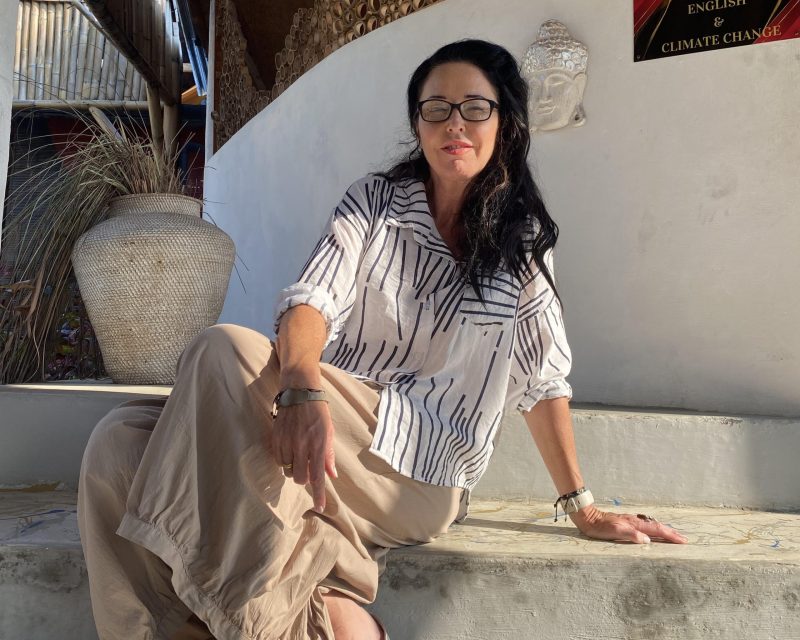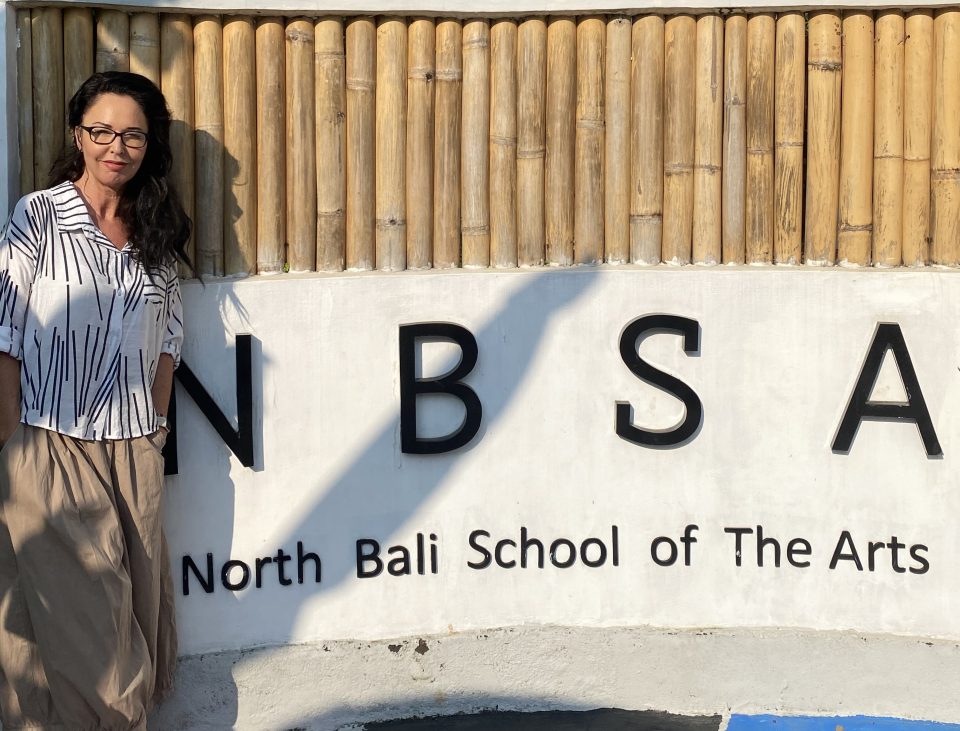Introducing a remarkable individual whose dedication to education and humanitarianism has made waves in Bali and beyond, Dr. Andrea Carroll is the visionary Founder/CEO of the Bali Dyslexia Foundation (BDF) and Principal/Co-Founder of the North Bali School of The Arts (NBSA).
She stands as a beacon of hope for underprivileged students navigating learning challenges such as dyslexia. With a Ph.D. in education and an unwavering commitment to transformative learning, Dr. Carroll’s journey reflects a profound dedication to positive change and notable accomplishments. Among these accomplishments stands the BDF. From its official registration in 2019 as Bali’s inaugural free service to strategic partnerships with local government bodies in 2022, the BDF has impacted the lives of thousands through comprehensive teacher training, student assessments, and tailored learning programs. Dr. Carroll’s recent venture, NBSA, further exemplifies her visionary leadership and commitment to inclusive education, promising success and meaningful impact in the years to come. Join Indonesia Expat as we delve into the extraordinary journey of Dr. Andrea Carroll, a true pioneer in the field of education and social change.
What led to the decision of relocating to Bali?
I came to Bali to work on educational research studies, specifically focusing on the subject of dyslexia. Before my research, there weren’t any primary studies or data on dyslexia. Unfortunately, I discovered it to be misrepresented and labelled as a mental condition resulting in dyslexic children being misunderstood. Being dyslexic myself along with my son and father gives me a deep holistic understanding of the condition as well as being fascinated about how neuroplasticity can have a profound impact on our learning ability. BDF was created conducive to my research studies; since then it has grown into a foundation that provides support not only for children but parents and teachers.
How has your journey thus far shaped your approach to teaching and Leadership?
My 7 year journey has been incredibly transformative, in so many ways. I get excited about educational opportunities every day, BDF and NBSA are now in a space where education meets innovation for neurodivergence. I feel I’m part of something far greater than me or BDF, it feels like a movement of awakening and acknowledging the greatness of dyslexic minds in Bali and I’m so happy and beyond grateful to be in a position to lead on this.
Tell us about NBSA.
Partly funded by BDF Ambassador Mark Stoddart, North Bali School of the Arts (NBSA) is deeply committed to providing a learning space for creative students of ages 16-19 years, providing high-quality teachers who understand neurodivergent learners. By merging education with the dynamic realm of technology and art, NBSA allows students to access alternative modes of schooling with a vocational focus. Through our courses and technologically integrated educational approach, NBSA provides young learners with the tools that will propel them onto thriving career paths.
A key foundation of our teaching model at NBSA is inclusivity. We are devoted to making the creative and technological industries accessible to learners of all levels. Especially when it comes to embracing neurodiversity, understanding how students may process the world differently is fundamental to our educational strategy. Our educators undergo training to UK standards to ensure they are equipped with the necessary knowledge to create a supportive learning environment that focuses on strength-based learning which values the individual talents of every student.
In terms of the program, we offer a two-year program with an optional third-year apprenticeship/work placement with one of our many business partners located in Indonesia or internationally. The program is accredited to International Standard Diploma levels 1 and 2, fulfilling our mission to prepare students with self-advocacy and real-world skills from which they can build their careers. The prospectus itself is streamlined to cover a diverse range of fields through the subjects offered, all of which can work in tandem with the passion project students complete during their time at NBSA. These subjects include:
- AI Artificial intelligence
- Digital Marketing
- Fashion Design and Textiles
- Coding and Programming
- Virtual Reality Performing Arts
- Fine Arts
All these subjects are specially chosen by NBSA to equip students with an expertise in key industries whilst allowing them the creative freedom to explore various career paths.
As a Co-Founder of NBSA, what were some of the initial challenges you faced in creating a supportive learning environment for students with Dyslexia in Bali?
The initial challenge I faced was there were no other charities or foundations that I could collaborate with, it was pretty mind-blowing to discover there was no support out there to help us navigate through the educational minefields. Dyslexia just isn’t acknowledged yet for what it is, it still carries a stigma of being lazy and stupid. I see this as a mammoth challenge because I need to shift the paradigm and the entire way of thinking about how dyslexia is perceived.
How does NBSA tailor its curriculum and teaching methods to meet the diverse needs of students with Dyslexia, ensuring both academic progress and personal growth?
We have 5 key Principles Of Learning: Happiness. Creativity. Critical Thinking. Self Development. Wellbeing.
At NBSA we have carefully crafted a transformative curriculum that reflects our dedication to nurturing a diverse blend of students, ideas, and creativity. Our campus is not just a place of education, it’s a vibrant community where every individual can find their unique voice and make a significant impact in today’s society.
Our curriculum is deeply rooted in the Humanistic Learning Theory, which places a strong emphasis on the freedom and autonomy of learners. We believe that enabling our students to learn in an environment that supports their unique needs and aspirations is fundamental to their growth and success.
The ultimate goal of our curriculum is to establish a direct link between learning and essential aspects of personal growth – self-development, critical thinking, creativity, well-being and happiness.
As a leader in the field of special education, what advice would you offer to educators, parents, and policymakers striving to create more inclusive and supportive environments for individuals with special needs?
As a leader in the field of dyslexia and special education, I would offer the following advice to educators, parents, and policymakers aiming to create more inclusive and supportive environments for individuals with special needs:
- Embrace Universal Design for Learning (UDL): Implement UDL principles in curriculum design and instructional practices to accommodate diverse learning needs. Provide multiple means of representation, expression, and engagement to ensure all students can access and participate in learning activities effectively.
- Foster Awareness and Understanding: Educate teachers, parents, and policymakers about dyslexia and other special needs to promote empathy, understanding, and acceptance. Encourage open dialogue and dispel myths and misconceptions surrounding learning differences.
- Provide Early Intervention and Support: Identify and intervene early in the educational journey to provide targeted support for students with dyslexia. Offer evidence-based interventions, such as structured literacy instruction, to address reading difficulties and prevent academic struggles.
- Implement Individualised Education Plans (IEPs): Develop personalised IEPs for students with dyslexia to outline specific goals, accommodations, and support services tailored to their unique needs. Collaborate closely with parents, teachers, and specialists to ensure the effective implementation of IEPs.
- Promote Assistive Technology: Integrate assistive technology tools and resources, such as text-to-speech software and audiobooks, to support students with dyslexia in accessing educational materials and completing assignments independently.
- Foster a Growth Mindset: Cultivate a growth mindset culture that celebrates effort, resilience, and progress rather than focusing solely on academic achievement. Encourage students with dyslexia to embrace their strengths, advocate for themselves, and persevere in the face of challenges.
- Advocate for Policy Changes: Advocate for policy changes at the local, state, and national levels to promote inclusive education practices and allocate resources for supporting students with dyslexia and other special needs. Collaborate with policymakers, advocacy groups, and stakeholders to enact meaningful reforms.
- Promote Parental Involvement and Empowerment: Engage parents as partners in their child’s education journey by providing them with information, resources, and support networks. Empower parents to advocate for their child’s needs and collaborate with educators to ensure a collaborative and supportive home-school partnership. By implementing these strategies and working collaboratively across all stakeholders, we can create more inclusive and supportive environments that empower individuals with dyslexia and other special needs to thrive academically, socially, and emotionally.
What’s next for you and the future of NBSA?
The future of NBSA holds exciting prospects for continued growth, innovation, and impact. As the visionary leader of NBSA, my focus is on further expanding our eco-friendly, carbon-neutral institution while maintaining our commitment to inclusive education and sustainable practices. We aim to enhance our curriculum by integrating more programs addressing art, tech’ and environmental stewardship, empowering students to become future leaders in sustainability. Additionally, I plan to forge strategic partnerships with organisations sharing our vision to amplify our reach and create meaningful opportunities for students from low-economic backgrounds. Ultimately, My goal is to cultivate a vibrant learning community where creativity, diversity, and environmental consciousness thrive, fostering holistic development and positive change in North Bali and beyond.
How can our readers get in touch?
- Website: nbsabali.org
- Email: hello@nbsabali.org
- Call: +62 859106989368




